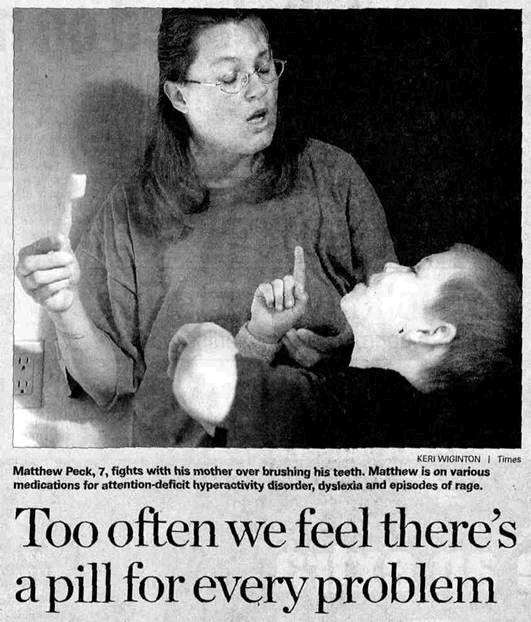St. Petersburg Times, Letters to the Editor
 I am the mother of a 16-year-old autistic son. First, autism is not a mental illness. There are physical situations that precede the condition. The best definition I ever heard came from Bob Doman, the founder of the National Association for Child Development, when he told me he referred to autism as “brain toxicity.”
I am the mother of a 16-year-old autistic son. First, autism is not a mental illness. There are physical situations that precede the condition. The best definition I ever heard came from Bob Doman, the founder of the National Association for Child Development, when he told me he referred to autism as “brain toxicity.”
Ryan used to have one to three violent tantrums a day. My husband and I have tried many things to help him recover from this condition. The most effective ones have been:
– Good nutrition and eliminating what he is allergic to. The allergies were determined by tests and simple observation.
– Getting the mercury removed from my son’s body. This is the “toxic brain” Doman mentioned.
– Homeschooling Ryan with the National Association for Child Development program.
Ryan is still autistic, but he can help around the house, feed and dress himself. His academic skills and speech continue to improve. He is also very well-behaved. I can take him anywhere in public.
My husband and I totally altered our lives to do what was best for our son. Drugging him would have made my life easier but would not have benefited my son. Our society is educated into “have a problem, take a pill.” It is a heartbreaking situation when pharmaceutical companies and doctors care more about their profit margin than the well-being and future of a child.
Kitty Young, Clearwater
A dangerous experiment
I commend Robert Farley for his article The atypical dilemma. There is a recklessness involved with the prescribing of antipsychotic drugs. They are being used for purposes and symptoms not approved by the Food and Drug Administration and it’s affecting our growing children – the future of our society.
Such drugs are, in effect, being used in an experimental fashion on the general public, except that it is being done in a completely unscientific manner. This experiment doesn’t even have the same controls nor has it been given the same respect that would be given to an experiment with laboratory rats. The statistics will be found in our future – good or bad.
Have we become a “pill popping” society only looking for a quick fix for our problems? Do we no longer have the time to handle our most prized possessions – our children?
Shouldn’t the FDA be controlling this issue?
Tobie Greenberg, Clearwater
Drugs are not a solution
Thanks for shedding some light on medication as a disastrous solution to educational and behavioral challenges.
I was a second-year teacher in Minnesota when I saw my first drugged third-grader. His parents had put him on medication because he was “nervous.” What seemed strange in 1969 had become the usual by 2000.
Instead of fixing problems that children have with their schools, homes or their bodies, the kids are medicated. It’s thalidomide for the brain for all we know.
Sharon Hillestad, Clearwater
Diet makes a difference
As an educator, I read your cover feature on atypical drugs with dismay, but not surprise. Given the amount of processed junk food, sugar and caffeine consumed by a typical American child on a daily basis, it could be worthwhile to try an alternative that doesn’t solely rely on dispensing dangerous drugs.
On the other hand, there’s not much money to be made with that approach. Therein lies the problem.
Gary Compton, Wesley Chapel
Ablechild, ADHD, antidepressants, Antipsychotics, children, drugging, toddlers

